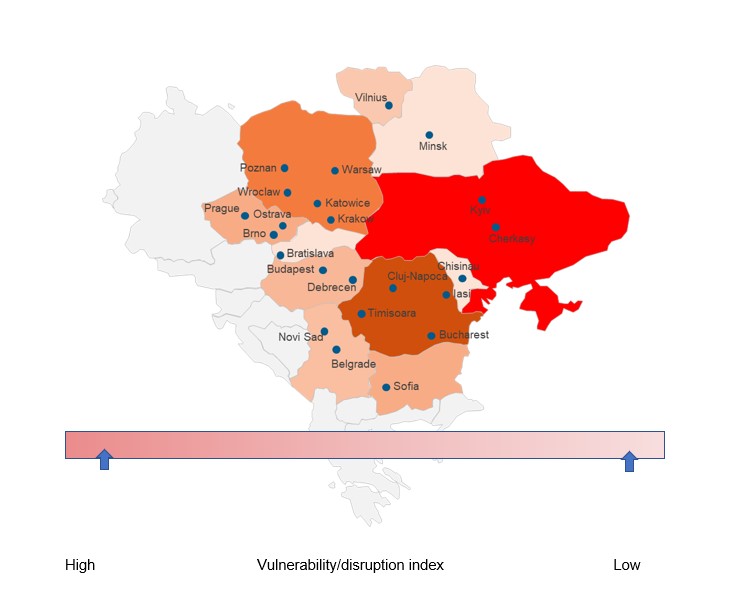
With Eastern Europe serving as a major hub for Customer Experience Management (CXM), the Russia-Ukraine crisis poses a serious threat to service delivery. Now is the time for enterprises with large presences in this region to diversify delivery locations and mitigate risks.
Read on for our expert analysis on the state of CXM outsourcing here, the potential disruptions, and alternative countries to consider for multilingual customer service and tech support to ensure continued CXM services.
Just as the world was looking to emerge from the global pandemic that caused a seismic shift in work and collaboration models, another highly disruptive crisis looms on the horizon. The recent geopolitical developments in Ukraine and Russia have caused the whole world to take notice, and with new sanctions kicking in every day, many are already preparing for adverse scenarios.
Given that this rift involves nuclear heavyweights in Russia and the NATO countries, the consequences could be far-reaching for the entire world. Consequently, these tense developments have created a lot of uncertainty and consternation for companies having a presence in the affected region.
Eastern Europe, which forms the immediate vicinity of Ukraine, is a major hub for delivering a plethora of customer experience management services for end-users both within and outside this region. Let’s take a look at the potential impacts to CXM outsourcing and alternative locations for CXM services.
Eastern European region CXM snapshot
As a strategic location for CXM services, eastern Europe offers strong multilingual capabilities, relatively inexpensive skilled talent, and cultural similarities and a minor time difference to western Europe. Leading global enterprises and Europe-focused players have a significant footprint in this region, putting them at risk in the current situation. The heatmap below illustrates the country-wise vulnerability index based on the number of delivery centers and corresponding CX agents present in each of them.

Potential CXM services disruptions and alternate solutions
Due to its skilled and relatively inexpensive IT talent pool, Eastern Europe is highly leveraged for its multilingual support for not only the regional languages such as Russian, Czech, Serbian, etc. but also for many of the major west European languages such as German, French, English, Spanish, and Italian. Poland and Romania also are sizeable talent sources for technical support.
Major cities in Ukraine such as Kyiv and Dnipro have been the most severely impacted by the armed conflict with Russia, and enterprises must accelerate Business Continuity Planning (BCP) measures to relocate affected CXM agents to safer parts of the country or outside of Ukraine to provide immediate relief.
If the conflict escalates beyond the borders of Ukraine in the coming weeks, major cities in Romania, Poland, and Bulgaria – which have the highest concentration of CXM delivery centers – could also be directly impacted.
We also envision a potential threat of cybersecurity breaches in Ukraine, inevitably causing collateral damage to its neighboring countries as well. While no one can foresee how the situation will unfold or its duration, enterprise clients must stay well informed and start devising backup scenarios and activate disaster recovery plans if needed. Although we believe the disruption will be temporary, a long-protracted war can’t be ruled out.
Alternative locations for CXM support services
Considering the uncertainty and volatility, let’s look at some viable alternate locations to help enterprises mitigate their emerging risks:
- Multilingual customer support – Enterprises should consider new offshore and onshore locations to support major European languages for CXM outsourcing, as illustrated below:

- Tech support – The best strategy for enterprises is keeping their complex tech-related support in-house through onshore locations. However, for simpler queries, alternative nearshore locations such as South Africa and Egypt offer similar advantages that Eastern European locations can provide at lower price points without any dip in the talent pool. Even offshore locations such as India and the Philippines are suitable alternatives to consider as long-term tech support outsourcing locations
Mitigate risks
The last two years have taught enterprises the glaring importance of risk mitigation as a strategic priority to ensure service continuity, and this year seems to be behaving no differently. Customer experience has established itself as a true differentiator for enterprises of all sizes and shapes in every industry. As such, ensuring that customer support services run unhindered is vital for enterprises to achieve their business outcomes.
Now, more than ever, diversification of service delivery locations will become increasingly relevant to counteract the rising instability that the current geopolitical tensions between Russia and Ukraine as well as similar such events could bring in the future.
While we hope that this devastating humanitarian crisis comes to an end as soon as possible, enterprises that closely re-examine their service delivery footprints and proactively mitigate their risks will be better positioned to absorb any shockwaves that could potentially arise in the coming months.
With the continuing escalating events, it is important to stay informed on the latest developments in this region. Contact us at [email protected] or [email protected] to discuss your situation and solutions.
Discover more about the impacts to the service delivery ecosystem in our LinkedIn Live event, How to Manage the Ukraine-Russia Impact on Service Delivery.
You can also keep up on the impact of service delivery from Ukraine and the CEE region in our resource center where you’ll find our consolidated coverage.








